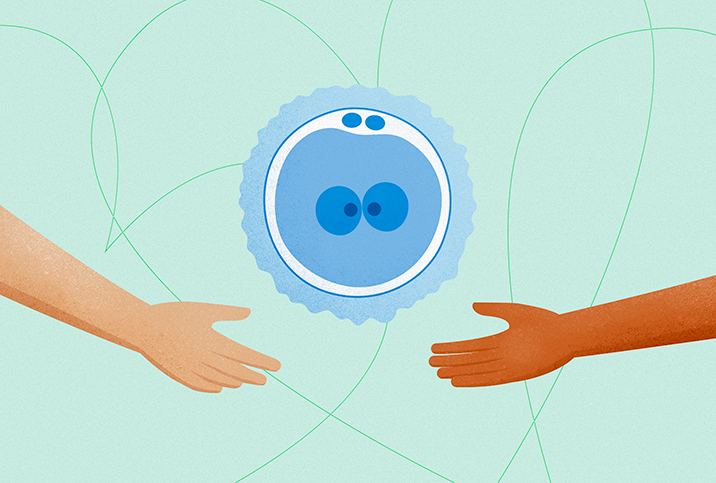The Facts About Women's Fertility

Many factors affect the ability to get pregnant, some controllable and some not. Discovering the underlying causes of infertility can help you determine what the next steps are in your conception journey.
What affects fertility
Age is a primary determining factor of female fertility. According to the American College of Obstetricians and Gynecologists, peak reproductivity occurs between the late teens to early 20s. After age 30, fertility begins to decline. Most women are unlikely to become pregnant without assistance once they reach age 45.
Age-related changes to the number and quality of eggs are usually unavoidable, unless you freeze your eggs before age 30. The aging process causes accumulated DNA damage that increases the likelihood of early pregnancy loss. As we get older, we're also more prone to other medical conditions that affect fertility. Issues involving the ovaries, uterus or fallopian tubes can make pregnancy difficult or sometimes impossible. Such conditions can include:
- Endometriosis: Affecting 2 to 10 percent of women between the ages of 25 and 40, endometriosis is when the tissue that makes up the uterine lining grows on other organs, causing inflammation, scarring and issues with ovulation and implantation.
- Diminished ovarian reserve: A decreased egg count in your ovaries may be related to age or medical issues.
- Medical history: Pelvic infections, ruptured appendix, abdominal surgery and untreated gonorrhea or chlamydia can cause permanent infertility.
- Pituitary gland tumors: Often benign, pituitary gland tumors can prevent ovulation by causing an overproduction of the hormone prolactin.
- Polycystic ovary syndrome (PCOS): This common disorder involves a hormonal imbalance in which excessive testosterone prevents regular ovulation.
- Premature menopause: Impaired ovarian function, including one year without a period before the age of 40, is considered premature menopause or premature ovarian insufficiency.
- Uterine fibroids: Fibroids are muscular tumors that grow in the wall of the uterus. Usually asymptomatic, in rare cases, fibroids may impair fertility or complicate pregnancy.
Healthy lifestyle choices
But some factors are only part of the fertility picture, and lifestyle plays a big role in human fertility. To boost fertility, start by focusing on strategies to improve your overall health and well-being. Living a moderately active lifestyle, eating a nutritious diet, maintaining a healthy weight, avoiding substance abuse and keeping stress under control give your body the best chance to achieve and maintain a successful pregnancy.
Exercise can enhance health and fertility. Being physically active for about 30 minutes daily is encouraged when trying to conceive and during pregnancy, but too much of a good thing can be a problem. Excessive exercise may put too much stress on your body, especially if you are underweight. If you start experiencing missed or irregular periods, you may want to ask your doctor about a condition called functional hypothalamic amenorrhea.
Eating well supports fertility and prepares your body for pregnancy. Suggestions from the Academy of Nutrition and Dietetics include choosing high-fiber carbohydrates with a low glycemic index, such as whole grains, brown rice, oatmeal and sweet potatoes. Instead of trans fats, opt for monounsaturated fats such as avocados and olives instead of processed or fried foods. Tofu, beans, nuts and other vegetable proteins are recommended in place of animal protein.
Maintaining adequate iron levels through vegetable sources and supplements may reduce certain types of infertility. Vegetarian iron sources such as beans, spinach, lentils and fortified cereals can be hard to absorb, but by pairing them with vitamin C, you can improve absorption. Getting enough folic acid is essential for women of childbearing age because the earliest stages of fetal development rely on this B vitamin. Many women take prenatal vitamins to help cover their nutritional bases when trying to conceive.
Being overweight or underweight can also negatively affect fertility. Although everyone is different, working to get your body closer to a healthy BMI range supports pregnancy goals. That said, it's never a good idea to compromise healthy habits for weight changes, so focus on getting enough sleep, staying active and eating nutritious foods to find your ideal weight.
Substance abuse, like smoking, drinking excessive alcohol and using illicit drugs, is known to damage fertility and negatively impact a developing fetus. Some women even benefit from reducing their caffeine intake while trying to conceive. Talk to your doctor if you struggle with substances so you can find resources to get a better handle on your habits before pregnancy.
Stress
Stress has multiple biological effects on fertility and pregnancy outcomes. The hypothalamus, pituitary gland and gonads function abnormally under stress, leading to issues that can include:
- Altered uterine gene expression
- Changes to follicular fluid composition
- Decreases in the gonadotropin-releasing hormone and gonadotropins
- Overactivity of the gonadotropin-inhibitory hormone on the neurons
- Poor egg quality
- A lower number of implantation sites
- Reduced ratio of the follicle-stimulating hormone to luteinizing hormone
- Stunted stromal cell growth (impacting the ovaries)
Too much stress also raises the risk of preterm birth and low birth weight, and may have lasting effects on a baby's organ tissue and function. While it's not always possible to control stress levels, raising your awareness of this concern while trying to conceive can enhance focus and motivation for stress management.
Environmental factors
Exposure to toxins in the environment is an increasing area of interest for fertility research. The chemical bisphenol A (BPA) appears to raise the risk of PCOS, endometriosis and uterine fibroids. Women with greater exposures to BPA respond poorly to fertility treatments, and after becoming pregnant, women exposed to BPA experience higher rates of preterm birth and miscarriage. Pesticides and phthalates—chemicals used to produce food containers, cosmetics and construction materials—may produce similar effects.
How to know if you're fertile
Testing women's fertility involves looking at a combination of lifestyle habits and health conditions. Your doctor will perform urine and blood tests to check your hormone levels (including thyroid hormones), ovarian reserve and screen for STDs. Initial testing is performed at your OB-GYN and you can be referred to a reproductive endocrinologist for further evaluation.
You'll be asked about sexual activity, past pregnancies, birth control, family history of birth defects and medication or supplement use. Your doctor may place you on hormone treatments or medication and monitor the effects on ovulation with follow-up visits.
Depending on your situation, your fertility specialist can recommend imaging tests and procedures to evaluate the health of your reproductive organs. These may include:
- Hysterosalpingography: A dye test inside the uterus to check for blocked fallopian tubes and check the shape of the uterine cavity
- Hysteroscopy: Views the inside of the uterus by inserting a camera with a thin light through the cervix
- Laparoscopy: Checks the fallopian tubes, ovaries and outside of the uterus by inserting a camera and a thin light through the abdomen
- Sonohysterography: Ultrasound inside the uterus to look for scarring or other issues
- Ultrasound exam: Looks at follicle changes to predict ovulation timing
Comprehensive fertility testing should include both you and your partner. Male infertility is an increasingly common problem that is estimated to be a contributing factor for 35 percent of couples with infertility. About 8 percent of the time, male infertility is the sole reason for lack of pregnancy. Male partners may be asked to provide a semen sample and meet with a urologist for evaluation.
Fortunately, infertility isn't necessarily permanent. Many of the causes of infertility can be addressed through lifestyle changes, hormone treatments or even surgery. With the help of a specialist, you can get the support and guidance to figure out the best course of action for you.
Fertility Procedures
If a medical condition is contributing to infertility, a procedure can help resolve the problem. A few treatment options exist for fibroids, but some surgical interventions, such as a hysterectomy, make future pregnancy impossible. To preserve fertility, you may consider a myomectomy to surgically remove fibroids or myolysis, which inserts a needle directly into the fibroids and destroys them with electric currents or freezing.
Endometriosis can be addressed through various procedures, depending on the severity of the condition. Some procedures for endometriosis will compromise fertility, so you'll need to consult with your healthcare provider about your best options. Generally, adhesions will be cut out, lasered off or destroyed with a heat gun because, left undisturbed, they can cause fertility issues and symptoms.
Very rarely, surgery can also fix blocked fallopian tubes and cure infertility in some cases, though most women with tubal issues will be referred for IVF. Between 20 and 30 percent of women who undergo operations for blocked fallopian tubes experience a successful pregnancy. Other procedures that may boost fertility include removing pituitary gland tumors, radioiodine therapy for hyperthyroidism or even bariatric surgery.
When the underlying cause of infertility cannot be addressed through other interventions, it may be time to consider assisted reproductive technology. Several treatments and medications can work to produce a healthy pregnancy. For instance, doctors can prescribe medication to stimulate the number of eggs released during ovulation in cases of diminished ovarian reserve. If fertilization doesn't happen naturally, intrauterine insemination or in vitro fertilization (IVF) may facilitate the process. Some women overcome age-related infertility by using previously frozen eggs or donor eggs. For those who cannot carry a pregnancy, surrogacy or adoption can be considered. There's no shortage of possibilities on the road to parenthood if you're willing to explore your options.
Resources
Talking with your OB-GYN is the first place to address your fertility concerns. Your doctor can refer you for additional testing or to a fertility clinic if necessary, where you'll learn about potential treatment options.
If you'd like help improving your eating habits, a registered dietitian nutritionist is a trusted professional trained to provide evidence-based advice. You can find a qualified nutrition expert by searching in your local area or finding a telehealth provider.
Infertility can be an isolating condition that leads to depression, low self-esteem, anxiety, relationship problems and reduced quality of life. If you're struggling with the emotional aspects of infertility, speaking to a mental health counselor can help. Use the American Psychiatric Association to search for a provider or ask your doctor for a referral. Your insurance company may offer in-house telehealth services for nutrition and mental health at no added cost. You can also ask your insurance carrier to help you locate providers near you that are in-network.
RESOLVE, the National Infertility Association, has online resources to help you find a virtual support group. Some groups are led by peers, while others are led by professionals. The RESOLVE Helpline is available in English and Spanish, and can be reached by calling 866-NOT-ALONE (866-668-2566). This voicemail system will give you a call back within one to three days to address various issues, including newly diagnosed infertility, adoption, recurrent miscarriage, male infertility, IVF and more.
While everyone’s fertility journey is different, technology and medical advances can be tools to assist you in getting pregnant, or to connect you with others going through the process. Infertility can be daunting, but remember, you are not alone.


















